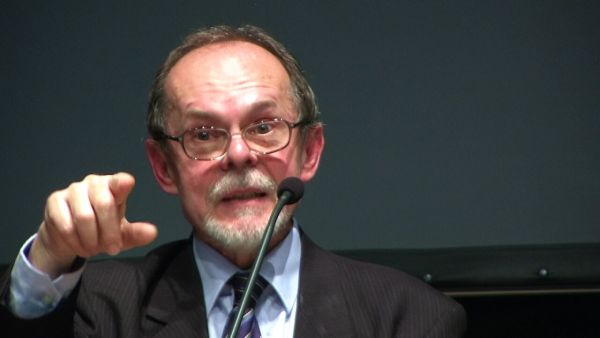László Bogár, an economist, university lecturer and pro-government publicist, went on public television in Hungary, in order to explain to viewers how the dastardly United States is using the refugee crisis as a weapon to destabilize Europe. According to Mr. Bogár, the EU’s real, “natural” allies are Russia and China. I’ve written before about another prominent pro-Fidesz publicist who also thought that the crisis was a weapon in the hands of invisible forces, but the fact that Hungary’s public broadcaster is now airing tin-foil hat conspiracy theories, and doing so on the public dime, has to be a new low.
This is what Mr. Bogár thinks in a little more detail, than what he aired on Magyar Televízió (it’s from the Magyar Hírlap daily paper, where he publishes on a regular basis):
“Empires always liked to believe and promote that they will last forever. As such, we need not be especially surprised that the elites of the United States believe this as well. This is what their ambassador in Budapest is trying to demonstrate, in her disciplinary speech; a speech that rather proved to be the pathetic effort of a decaying empire. The only thing that’s more amusing is how their ‘local’ lackeys desperately attempted to make it appear as though anyone still cared about a decaying empire’s efforts at sounding tough…Today, they are producing such a planetary vortex, that is pumping out wrecked societies into Europe, which is now its rival, in order to use this as a weapon to wipe out our continent.”
The internal contradiction in this university professor’s hypothesis is quite apparent: while Ambassador Colleen Bell’s criticism of the Orbán government should not be taken seriously, because she is nothing more than the representative of a decaying empire, the nefarious Americans are still powerful enough to bring about a planetary vortex and to single-handedly choreograph the entire refugee crisis.
All of this, and Mr. Bogár’s television follow-up, was enough to get the conservative Mandiner blog to publish a scathing entry on the depravity of public broadcasting in Hungary and to also point out that the European Union’s largest trading partner is still the United States and not China. US-EU trade totals 515 billion euros per year, while trade between the EU and China amounts to 467 billion euros.
“The public broadcaster invites László Bogár as an expert, in order to give him a platform to air his absurdities. And then the Hungarian State News Agency (MTI) writes a report on it, to ensure that the package spreads nicely in public opinion,” writes Gellért Rajcsányi, Mandiner’s assistant editor. “Claiming, based on ‘expert opinion,’ that Europe, China and Russia complement each other, while the US can get lost, is–for all informed people–a wildly false, empty, misleading and stupid joke. And for the less informed masses, it is a piece of disinformation of humiliating proportions,” added Mr. Rajcsányi.
As is common on the Hungarian right, the desired connections with eastern powers and authoritarian regimes is rarely based on logical and pragmatic economic considerations or on empirical evidence suggesting that it makes sense. Instead, the justification is a completely intangible, vague cultural “kinship,” which is usually nothing more than the sense that China and Russia are opponents of the meddlesome United States, hence ‘we should be friends.’ Perhaps even more importantly: one hotbed of corruption and authoritarian rule is understandably more inclined to team up with other similarly corrupt regimes, where the question of accountability won’t surface in bilateral discussions.
Mr. Rajcsányi, a more thoughtful voice on the Hungarian right, notes: “What does Europe export to China’s and Russia’s culture and society? Liberal democracy? Rule of law? A system of checks and balances? Freedom of opinion? Western Christianity? Gay marriage? So what can justify Mr. Bogár’s discovery on how Europe, China and Russia complement each other socio-culturally?”
It’s a good question and one that I can’t answer. But perhaps Professor Bogár will impart this knowledge to Hungarian university students in his next lecture.




